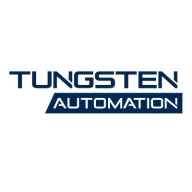


Tungsten RPA and IBM Robotic Process Automation compete in the automation sector, with each offering distinct advantages. IBM RPA appears to have a slight upper hand due to its strong performance, feature integration, and extensive deployment options.
Features: Tungsten RPA offers flexibility and ease of use, enabling non-technical users to automate tasks efficiently. It includes seamless deployment and integration with modules such as Kofax TotalAgility for comprehensive process management. IBM RPA provides advanced integration with Watson, a synthetic API, and comprehensive workflow orchestration, making it suited for complex environments with hybrid cloud deployment.
Room for Improvement: Tungsten RPA could improve in exception handling and AI integration. Users suggest enhancements in machine learning capabilities and technical support levels. IBM needs better documentation, error handling, and broader AI integration. Users also recommend improved access to tools and role-based user permissions.
Ease of Deployment and Customer Service: Tungsten RPA offers on-premises deployment with satisfactory technical support, although faster response times are desired. IBM offers various deployment options, including hybrid cloud, supported by highly responsive customer service due to significant R&D investments.
Pricing and ROI: Tungsten RPA provides cost-effective solutions with a modular pricing strategy, although initial costs may be higher. IBM offers competitive pricing based on Virtual Processor Cores, providing flexibility and scalability, which many users find economically viable. Both solutions claim significant ROI through resource optimization and reduced manual labor.
Fortra's Automate has effectively replaced the workload of an entire employee, saving us significant time and money.
It has reduced our expenditures in terms of purchasing more products and employing more technicians.
On a scale from one to ten, I would rate the ROI as nine.
My customers have seen high ROI with IBM Robotic Process Automation (RPA) because it has a lower cost than other vendors.
They don't always understand the processes I'm trying to implement.
I would rate the technical support as a nine out of ten because it is quite fast and courteous.
They are very responsive and have been able to resolve any issues I have encountered.
They need to improve their support by having more experienced level one support.
The scalability of Automate also scores a ten out of ten.
It is easy to increase one bot or one studio without needing to buy another orchestrator, which can be quite expensive.
Automate is stable for my needs and is highly scalable, allowing the same workflow to serve numerous tasks effectively.
The solution is very scalable because it's supported by Cloud Pak for Automation, allowing scaling with other solutions or independently.
I would rate the scalability of IBM Robotic Process Automation (RPA) as eight on a scale of one to ten.
The stability of the solution is a ten out of ten.
For stability on a scale from one to ten, I would give it a solid nine.
It has very robust features, and it is not prone to instability.
IBM Robotic Process Automation (RPA) has been running smoothly for four years without any errors, which indicates a high level of stability.
This is a significant concern, especially with critical workloads where visibility into errors is essential.
My major recommendation would be for easier upgrade paths between major versions.
When new employees join our company, we created automation so they receive AWS credentials and all their AWS access and cloud access.
To improve IBM Robotic Process Automation (RPA) for the next release, there should be more integration with external systems, and more integration with IBM's data and AI platforms is needed.
Competitors are often more expensive than Automate.
It offered what we wanted at a good, competitive price.
It does a lot but also costs a lot.
The pricing of IBM Robotic Process Automation (RPA) is an area that could be improved.
Automate's non-reliance on additional orchestrators makes it quite cost-effective.
In my opinion, the best feature Automate offers is the scheduling.
Automate's compatibility with existing IT infrastructure has impacted our business operations positively by providing smooth integration with other software that we use, such as Gmail, Jira, and Microsoft 365 apps, which gives us a unified platform instead of having to keep switching from one software to another, saving a lot of time and streamlining the whole workflows.
We haven't encountered any errors in the last four years, which speaks to its reliability.
The analytics and reporting tools in IBM Robotic Process Automation (RPA) are the best compared to all other RPAs because all other RPAs only use dashboards while IBM is the only one to have a reporting tool that includes dashboards.
| Product | Market Share (%) |
|---|---|
| Fortra's Automate | 2.7% |
| Tungsten RPA | 2.0% |
| IBM Robotic Process Automation (RPA) | 3.0% |
| Other | 92.3% |


| Company Size | Count |
|---|---|
| Small Business | 25 |
| Midsize Enterprise | 10 |
| Large Enterprise | 9 |
| Company Size | Count |
|---|---|
| Small Business | 14 |
| Midsize Enterprise | 3 |
| Large Enterprise | 10 |
| Company Size | Count |
|---|---|
| Small Business | 11 |
| Midsize Enterprise | 1 |
| Large Enterprise | 18 |
Fortra's Automate offers a user-friendly platform for task automation, featuring a drag-and-drop interface that aids in scheduling, file management, and integrating with services like Azure and AWS.
Fortra's Automate provides substantial ease in automating complex tasks through its intuitive design. It offers seamless integration capabilities, especially with Azure and AWS, and comes equipped with strong error handling. Cost-effective and requiring minimal coding, it supports a broad range of industries by effectively automating tasks such as HR operations, invoice management, and data processing across servers.
What features stand out in Fortra's Automate?
What benefits should users consider in reviews?
In industries such as healthcare and transportation, Fortra's Automate facilitates the automation of client management, HR operations, and data processing, boosting efficiency. Banks utilize it for managing extensive invoice workflows, while distribution sectors rely on its capabilities for insurance checks and system support. Its applicability across servers makes it a valuable tool for any sector seeking to reduce manual workload and improve task accuracy.
IBM Robotic Process Automation (RPA) is a technology that encompasses the use of smart robots in any process requiring efficiency, consistency and speed, with no risk of mistakes. In a nutshell, RPA simulates a human user working.
Today, it is possible to automate processes through the use of digital robots, or bots, which execute pre-programed, repetitive tasks in a safe and mistake free manner. There are literally thousands of opportunities for Robotic Process Automation to make an impact on your organization today, including: automatic invoice emission, system integration, information reconciliation, report generation, intelligent email management to lead generation, and many others.
We monitor all Robotic Process Automation (RPA) reviews to prevent fraudulent reviews and keep review quality high. We do not post reviews by company employees or direct competitors. We validate each review for authenticity via cross-reference with LinkedIn, and personal follow-up with the reviewer when necessary.